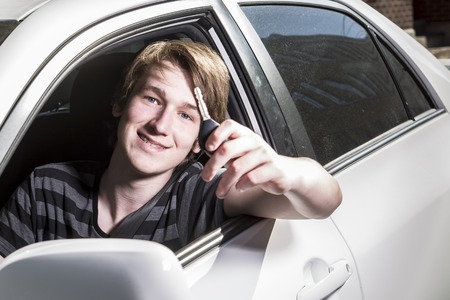Why Are New Drivers Among The Most Distracted Drivers?
October 5, 2016 | Category: Automobile Accidents, Personal Injury | ShareRegardless of age, distractions are known to increase the overall cognitive load, which can impair a driver’s ability to react to the driving environment. Novice drivers have a lower threshold of impairment because they are concentrating on mastering a new skill. Should the novice driver be a young teen driver, researchers suggest that many key areas of the brain are still in the development stage. These areas include judgment and decision-making which are important when driving. Managing potentially distracting behaviors and situations while driving become even more difficult, according to the American Automobile Association (AAA).
 Of the novice drivers, young drivers have more difficulty in concentrating on driving while being distracted by cell phones, passengers, or eating and drinking.
Of the novice drivers, young drivers have more difficulty in concentrating on driving while being distracted by cell phones, passengers, or eating and drinking.
A recent AAA Foundation for Traffic Safety study showed that 60 percent of teen crashes are caused by distracted driving. The most common forms of distraction which lead up to a crash by teen drivers included:
- Interacting with one or more passengers: 15 percent of crashes
- Cell phone use: 12 percent of crashes
- Looking at something in the vehicle: 10 percent of crashes
- Looking at something outside the vehicle: 9 percent of crashes
- Singing/moving to music: 8 percent of crashes
- Grooming: 6 percent of crashes
- Reaching for an object: 6 percent of crashes
To avoid distractions, the National Transportation Safety Board recommends novice drivers:
- Concentrate on the road, not on the conversations around you, the music that is playing, or the friend calling on your cell phone.
- Novice drivers should be prohibited from driving between certain times, specifically midnight to 5 a.m.
- Limit the number of people in the car. The NTSB recommends that young, novice drivers with provisional (intermediate) licenses should be prohibited from carrying more than one passenger under the age of 20 until they receive an unrestricted license or for at least 6 months (whichever is longer).
- Make adjustments to vehicle controls such as radios, air conditioning, or mirrors before beginning to drive or after the car is no longer in motion.
- Don’t reach down or behind the driver’s seat, pick up items from the floor, open the glove compartment, clean the inside windows, or perform personal grooming while driving.
- Put your cell phone away while driving. Let your wireless network voice mail pick up your calls when you are driving and answer text messages after you stop.
- If you have to use your phone while driving, pull off the road, stop, and then dial.
The NTSB has long been concerned with the issues of distracted driving and novice drivers. After an investigation, the Board recommended that all states prohibit holders of learner’s permits and intermediate licenses from using cell phones while driving.
“Contact the Spivey Law Firm, Personal Injury Attorneys, P. A. if you or a loved one has been injured in an accident caused by another driver,” said Fort Myers Auto Accident Attorney, Randall Spivey.
Fort Myers Auto Accident Attorney, Randall L. Spivey is a Board Certified Trial Attorney – the highest recognition for competence bestowed by the Florida Bar and a distinction earned by just one (1%) percent of Florida attorneys. He has handled over 2,000 personal injury and wrongful death cases throughout Florida. For a free and confidential consultation to discuss your legal rights, contact the Spivey Law Firm, Personal Injury Attorneys, P.A., in Lee County at 239.337.7483 or toll free at 1.888.477.4839,or by email to Randall@SpiveyLaw.com. Visit SpiveyLaw.com for more information. You can contact Spivey Law Firm, Personal Injury Attorneys, P.A.in Charlotte County at 941.764.7748 and in Collier County 239.793.7748.

